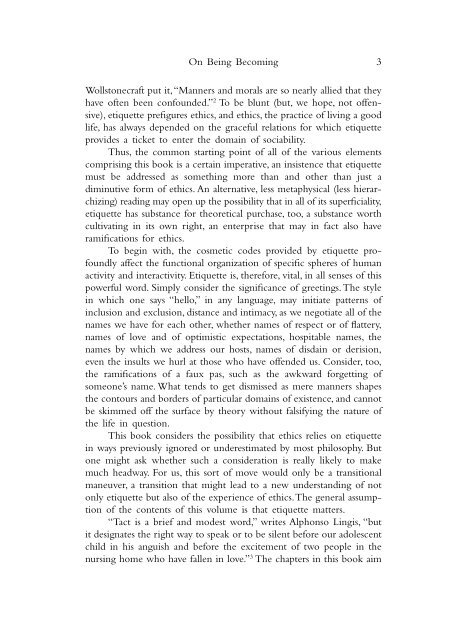Create successful ePaper yourself
Turn your PDF publications into a flip-book with our unique Google optimized e-Paper software.
On Being Becoming<br />
Wollstonecraft put it, “Manners and morals are so nearly allied that <strong>the</strong>y<br />
have <strong>of</strong>ten been confounded.” 2 To be blunt (but, we hope, not <strong>of</strong>fensive),<br />
etiquette prefigures ethics, and ethics, <strong>the</strong> practice <strong>of</strong> living a good<br />
life, has always depended on <strong>the</strong> graceful relations for which etiquette<br />
provides a ticket to enter <strong>the</strong> domain <strong>of</strong> sociability.<br />
Thus, <strong>the</strong> common starting point <strong>of</strong> all <strong>of</strong> <strong>the</strong> various elements<br />
comprising this book is a certain imperative, an insistence that etiquette<br />
must be addressed as something more than and o<strong>the</strong>r than just a<br />
diminutive form <strong>of</strong> ethics. An alternative, less metaphysical (less hierarchizing)<br />
reading may open up <strong>the</strong> possibility that in all <strong>of</strong> its superficiality,<br />
etiquette has substance for <strong>the</strong>oretical purchase, too, a substance worth<br />
cultivating in its own right, an enterprise that may in fact also have<br />
ramifications for ethics.<br />
To begin with, <strong>the</strong> cosmetic codes provided by etiquette pr<strong>of</strong>oundly<br />
affect <strong>the</strong> functional organization <strong>of</strong> specific spheres <strong>of</strong> human<br />
activity and interactivity. Etiquette is, <strong>the</strong>refore, vital, in all senses <strong>of</strong> this<br />
powerful word. Simply consider <strong>the</strong> significance <strong>of</strong> greetings. The style<br />
in which one says “hello,” in any language, may initiate patterns <strong>of</strong><br />
inclusion and exclusion, distance and intimacy, as we negotiate all <strong>of</strong> <strong>the</strong><br />
names we have for each o<strong>the</strong>r, whe<strong>the</strong>r names <strong>of</strong> respect or <strong>of</strong> flattery,<br />
names <strong>of</strong> love and <strong>of</strong> optimistic expectations, hospitable names, <strong>the</strong><br />
names by which we address our hosts, names <strong>of</strong> disdain or derision,<br />
even <strong>the</strong> insults we hurl at those who have <strong>of</strong>fended us. Consider, too,<br />
<strong>the</strong> ramifications <strong>of</strong> a faux pas, such as <strong>the</strong> awkward forgetting <strong>of</strong><br />
someone’s name. What tends to get dismissed as mere manners shapes<br />
<strong>the</strong> contours and borders <strong>of</strong> particular domains <strong>of</strong> existence, and cannot<br />
be skimmed <strong>of</strong>f <strong>the</strong> surface by <strong>the</strong>ory without falsifying <strong>the</strong> nature <strong>of</strong><br />
<strong>the</strong> life in question.<br />
This book considers <strong>the</strong> possibility that ethics relies on etiquette<br />
in ways previously ignored or underestimated by most philosophy. But<br />
one might ask whe<strong>the</strong>r such a consideration is really likely to make<br />
much headway. For us, this sort <strong>of</strong> move would only be a transitional<br />
maneuver, a transition that might lead to a new understanding <strong>of</strong> not<br />
only etiquette but also <strong>of</strong> <strong>the</strong> experience <strong>of</strong> ethics. The general assumption<br />
<strong>of</strong> <strong>the</strong> contents <strong>of</strong> this volume is that etiquette matters.<br />
“Tact is a brief and modest word,” writes Alphonso Lingis, “but<br />
it designates <strong>the</strong> right way to speak or to be silent before our adolescent<br />
child in his anguish and before <strong>the</strong> excitement <strong>of</strong> two people in <strong>the</strong><br />
nursing home who have fallen in love.” 3 The chapters in this book aim<br />
3
















